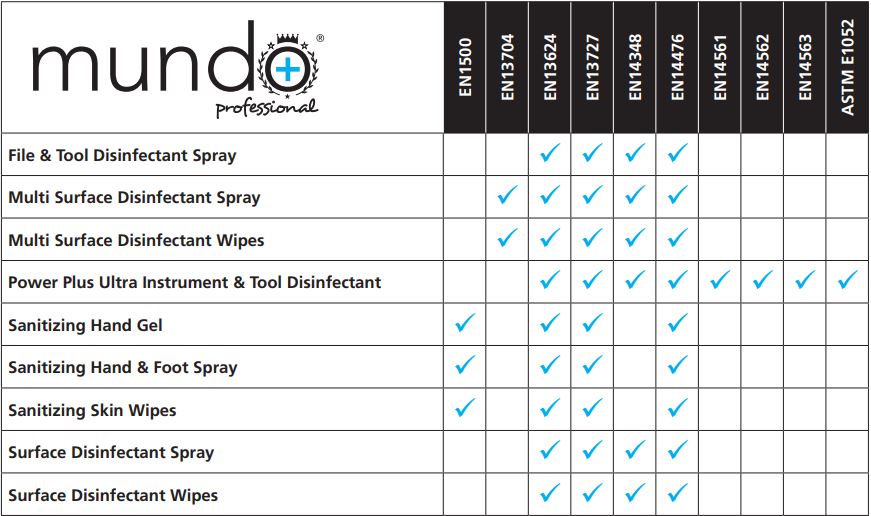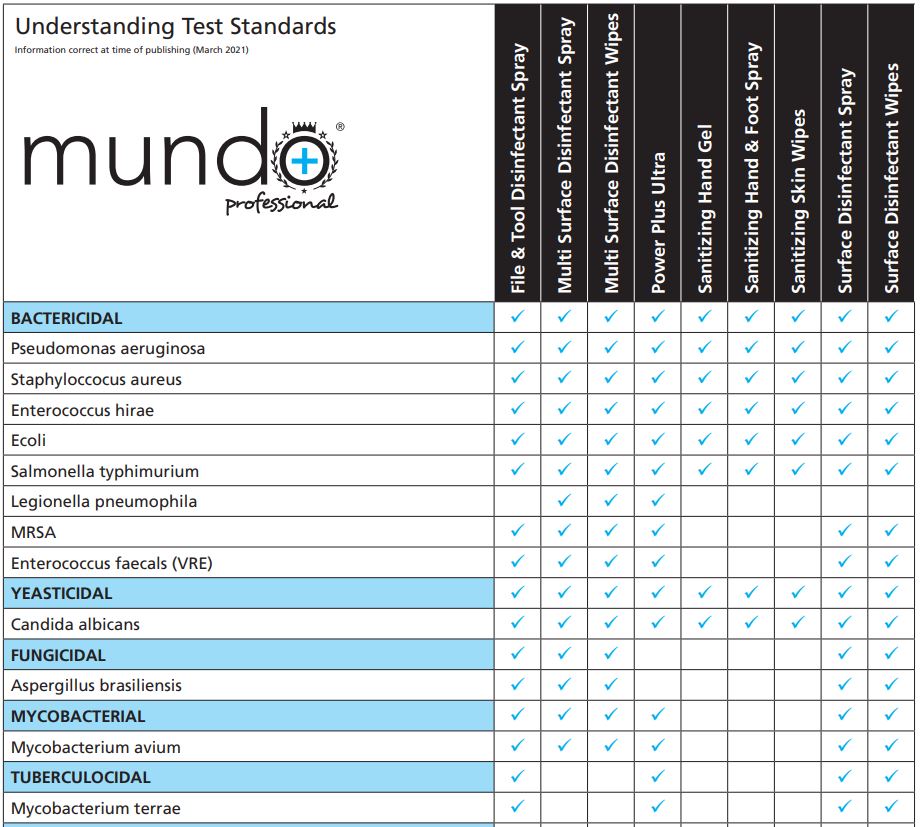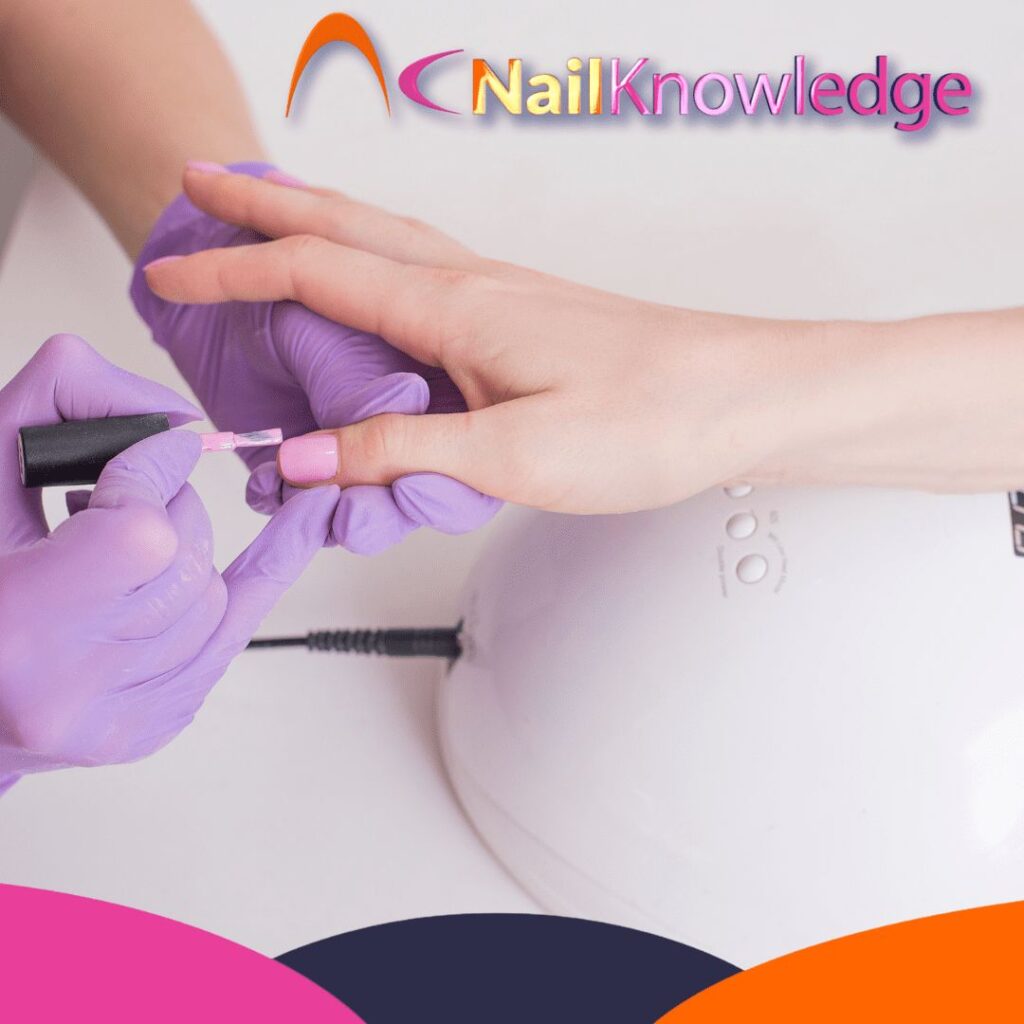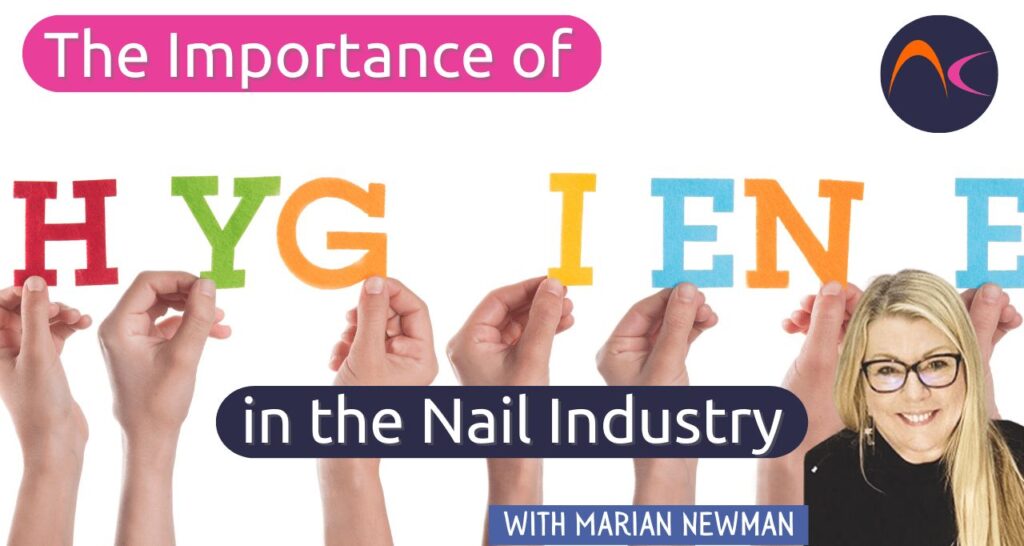Whether you work in a salon or are mobile, hygiene and infection control should be high on your agenda of importance.
Don’t Skimp on Hygiene Education: Lessons from Lockdown
So many courses skip a lot of this education. I think this was very apparent during lockdown and re-opening guidelines were issued. Not much of it was new (masks and distancing apart) and many had no idea how to ensure a hygienic environment and tools.
Nail Services and the Importance of High Standard Hygiene
For nail services, hygiene does not need to be to a medical standard but it still needs to be of a high standard. There can be all sorts of cuts or abrasions on hands and fingers that are noticeable but are an open door to pathogens.
There are plenty of proprietary brands available for salons but do you know what you are buying?
For instance, are you aware that, in the UK, every disinfectant can only make accurate claims that can be backed up by rigorous testing and must have an EN number (legal requirement!)
Understanding Disinfectant EN Numbers: What They Mean
EN numbers refer to what the product has been tested against. Here is a chart of numbers and their current testing protocols;
EN1500 Chemical disinfectants and antiseptics. Hygienic handrub. Test method and requirements (phase 2, step 2).
EN13624 Chemical disinfectants and antiseptics. Quantitative suspension test for the evaluation of fungicidal or yeasticidal activity in the medical area. Test method and requirements (phase 2, step 1).
EN13704 Chemical disinfectants. Quantitative suspension test for the evaluation of sporicidal activity of chemical disinfectants used in food, industrial, domestic and institutional areas. Test method and requirements (phase 2, step 1).
EN13727 Chemical disinfectants and antiseptics. Quantitative suspension test for the evaluation of bactericidal activity in the medical area. Test method and requirements (phase 2, step 1).
EN14348 Chemical disinfectants and antiseptics. Quantitative suspension test for the evaluation of mycobactericidal activity of chemical disinfectants in the medical area including instrument disinfectants. Test methods and requirements (phase 2, step 1).
EN14476 Chemical disinfectants and antiseptics. Quantitative suspension test for the evaluation of virucidal activity in the medical area. Test method and requirements (phase 2, step 1).
EN14561 Chemical disinfectants and antiseptics. Quantitative carrier test for the evaluation of bactericidal activity for instruments used in the medical area. Test method and requirements (phase 2, step 2).
EN14562 Chemical disinfectants and antiseptics. Quantitative carrier test for the evaluation of fungicidal or yeasticidal activity for instruments used in the medical area. Test method and requirements without mechanical action (phase 2, step 2).
EN14563 Chemical disinfectants and antiseptics. Quantitative carrier test for the evaluation of mycobactericidal or tuberculocidal activity of chemical disinfectants used for instruments in the medical area. Test method and requirements (phase 2, step 2).
ATSM E1052 Standard Test Method for Efficacy of Antimicrobial Agents Against Viruses in Suspension. The Evaluation of antiviral properties of a product using a Virucidal Suspension Assay.
Here is a chart that makes a bit more sense. It has been supplied by Mundo, a very ethical and efficient hygiene product manufacturer. This will help you to decide what EN number is right for your environment.


Cleaning, Disinfecting, and Sterilising: The Different Levels of Decontamination
What is essential to understand is that before anything can be disinfected it must be cleaned. This means with warm water and soap and a brush if the tool has crevices e.g. nippers.
Putting uncleaned tools into a disinfectant does not disinfect them so it is useless to it.

If you remember, during Covid the strict guidance was to wash your hands with soap and water for 20 seconds. Hand sanitisers were not as effective but better than nothing if no sink is available. But hand sanitisers are primarily alcohol and they need to be in contact for a minimum period of time, many hand sanitisers evaporated too quickly to be effective and didn’t remove any debris.
Cleaning is the lowest level of decontamination, disinfection is higher depending on the product and sterilising (autoclave of hot air) is the highest.
A good quality biocide or medicine is sufficient for nail salons as long as manufacturers instructions are followed with regard to dilution, contact time and usable time.
From Wound Sprays to Airplanes: The Versatility of Hypochlorous Acid
I personally am a big fan of hypochlorous acid. This sounds scary but is one of the safest, most efficient and eco-friendly of them all. It is ionised water and salt. It destroys almost everything on contact and is safe for skin, food and even babies! I did a lot of research on this during the lockdown.
It has been in medical use for decades and was even used in WW11 to spray wounds to avoid infection.
It is an unstable chemical and is only effective for several hours. However, a new product is on the way that has stabilised it enough to be effective for 12 months. Lots and lots of testing has been done with it and I use it for many things already and will be taking it on some long flights I have coming up to spray every inch of my seat and the loos. Also, I have just recovered from covid and have sprayed my toothbrush as, apparently, the virus can be trapped in the bristles and reinfect!! EEEK
Germ-Aware, Not Germaphobe: Tips for Maintaining Effective Infection Control
I’m not a germaphobe but I am germ aware so very conscious of infection control. There recently was a warning about smoked salmon for pregnancy and over 65’s as it is raw and there is a chance of listeria. I have some gorgeous smoked salmon in the freezer and that put me off eating it. However, I have now defrosted it as you can spray it directly onto food. It is that safe!
Reviewing and Improving Your Hygiene Protocols

Review your hygiene protocols and make them as safe as possible. Especially as we keep hearing about new viruses coming along!! Let’s not have another pandemic


